ทำให้เกิดการสร้างขยะสุทธิเป็นศูนย์ในสังคมด้วยการเปลี่ยนขยะให้เป็นของมีค่า
ทุกกิจกรรมของมนุษย์ก่อให้เกิดขยะในรูปแบบใดรูปแบบหนึ่ง
ERS คือระบบรีไซเคิลแบบเป็นมิตรกับสิ่งแวดล้อมที่มุ่งสร้างสังคมแห่งการหมุนเวียนทรัพยากรในนานาประเทศด้วยการเปลี่ยนขยะให้เป็นทรัพยากรที่มีคุณค่า.
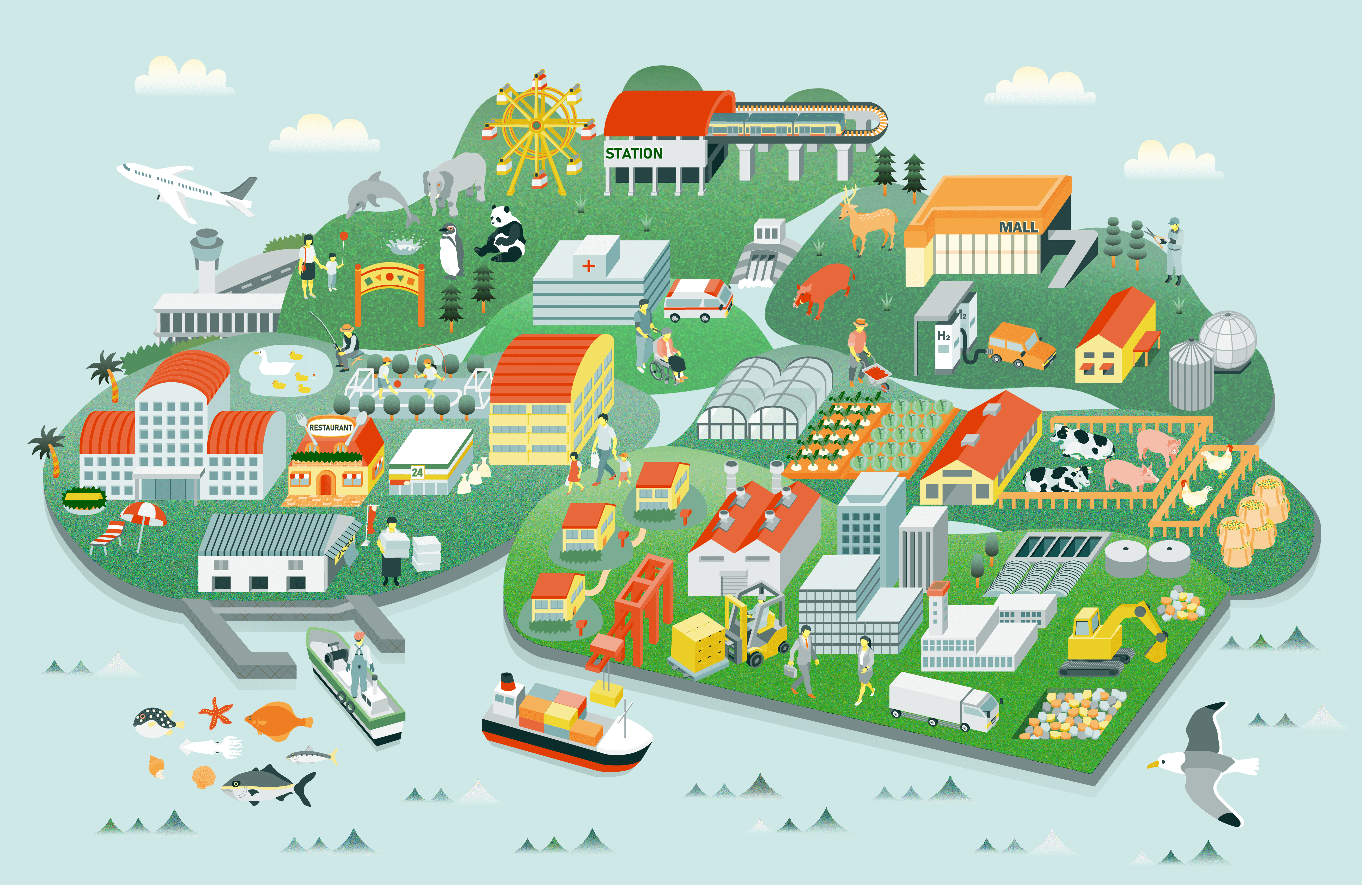
-
 เทศบาล
เทศบาล
-
 ปศุสัตว์
ปศุสัตว์
-
 เกษตรกรรม
เกษตรกรรม
-
 การประมง
การประมง
-
 โรงพยาบาล
โรงพยาบาล
-
 โรงเรียน
โรงเรียน
-
 โรงงาน
โรงงาน
แปรรูปอาหาร -
 โรงแรม
โรงแรม
-
 ร้านอาหาร
ร้านอาหาร
-
 ร้านค้าปลีก
ร้านค้าปลีก
-
 สนามบิน
สนามบิน
-
 ท่าเรือ
ท่าเรือ
 Overall
Overall

ERS (Environmental Recycling System)
ERS สามารถใช้จุลินทรีย์ซึ่งมีเฉพาะในท้องถิ่นที่ติดตั้งระบบนี้ในการฆ่าเชื้อ หมัก และกำจัดความชื้นขยะประเภทต่าง ๆ ภายใน 24 ชั่วโมง
ขยะที่ผ่านการแปรรูปด้วยกระบวนการ ERS จะกลายเป็นเชื้อเพลิงที่แห้งสนิทและไม่มีกลิ่น ปุ๋ย อาหารสัตว์ และวัสดุรองนอนสำหรับปศุสัตว์
ERS มีส่วนช่วยอย่างมากในการกระตุ้นให้เกิดการสร้างสังคมขยะสุทธิเป็นศูนย์

 Waste recycling system using ERS
Waste recycling system using ERS
ขยะสามารถกลายเป็นทรัพยากรที่มีค่าได้ ไม่ว่าจะเป็นขยะมูลฝอย ผ้าอ้อมใช้แล้ว สิ่งปฏิกูลของมนุษย์และสัตว์ กากตะกอนน้ำเสีย ของเสียทางการเกษตร เศษอาหาร อาหารบรรจุกล่องที่ถูกทิ้ง ขยะจากการก่อสร้าง เศษไม้ หญ้าที่ถูกตัด ฯลฯ - เราไม่จำเป็นต้องทิ้งขยะเหล่านี้ไปเฉย ๆ แต่สามารถแปลงสิ่งเหล่านี้ให้เป็นทรัพยากรที่มีค่าด้วย ERS
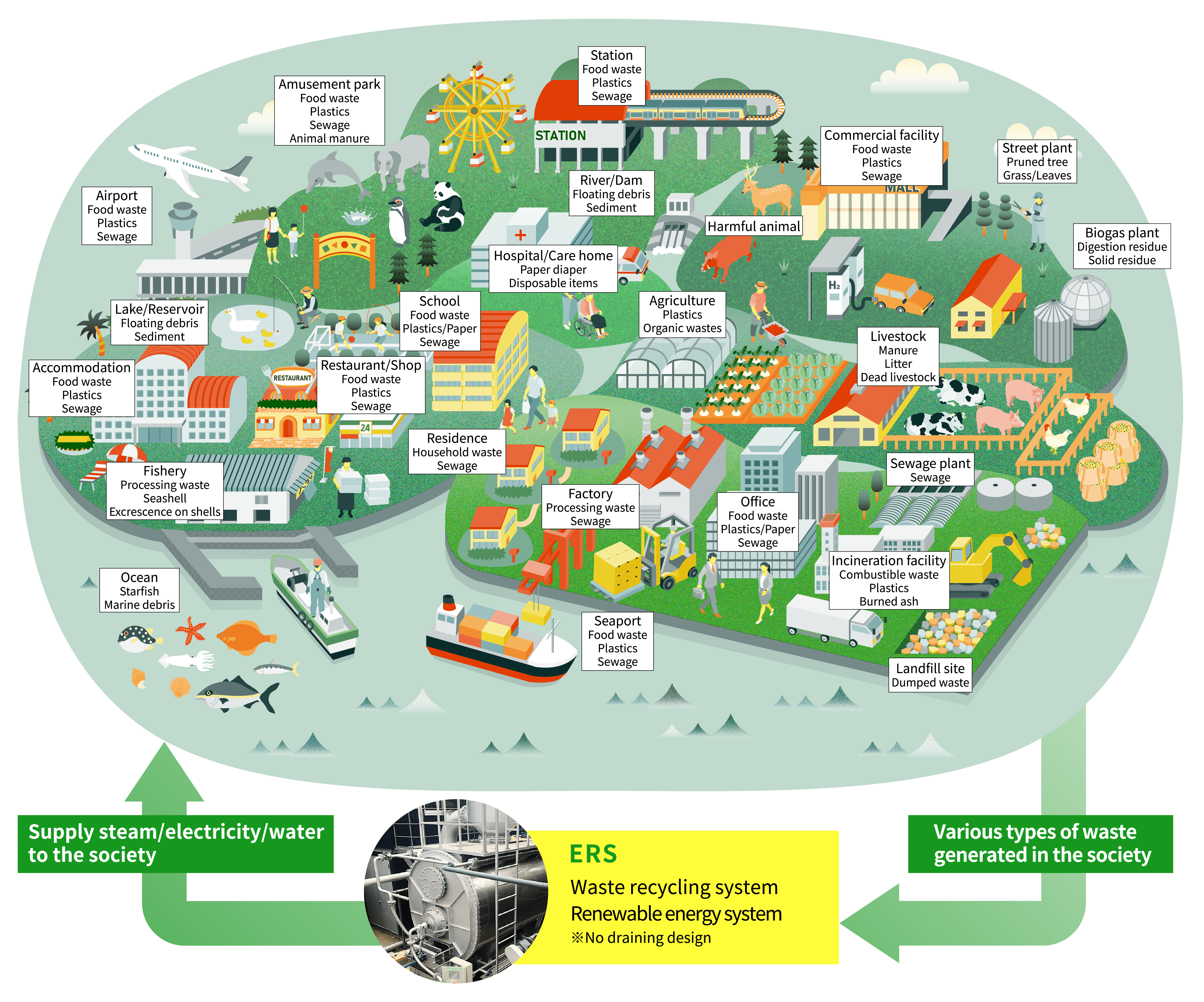
 Creation of resource recycling society
Creation of resource recycling society
เราจำเป็นต้องใช้ทรัพยากรที่มีจำกัดอย่างมีประสิทธิภาพโดยไม่นำไปทิ้งให้เสียเปล่า ERS จะยกระดับประสิทธิภาพด้านสิ่งแวดล้อมด้วยการสร้างพลังงานจากขยะและช่วยให้เกิดการวางโครงสร้างชุมชนแห่งการรีไซเคิลต่อไป
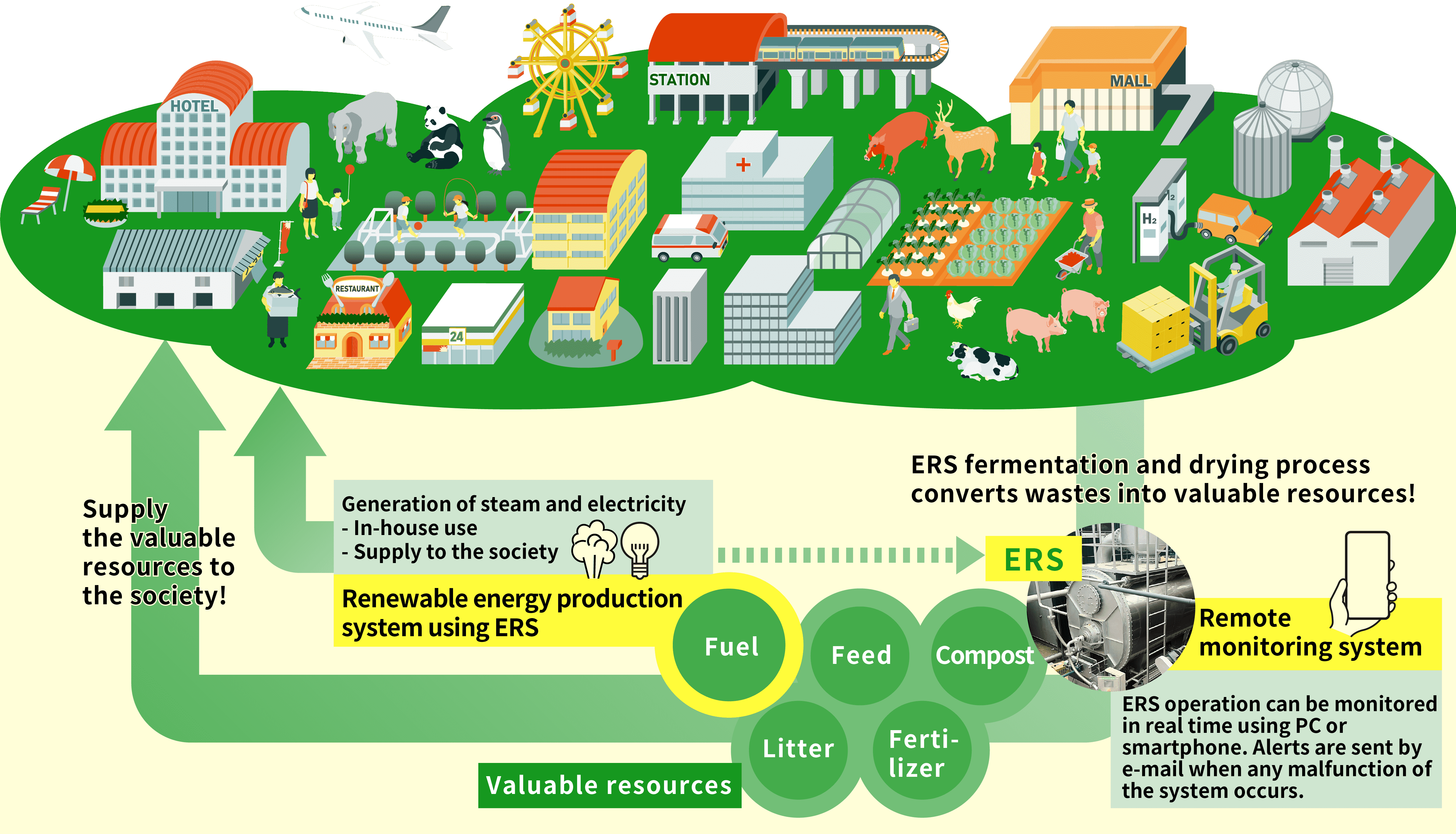
 ERS system structure and features
ERS system structure and features

How ERS works and features in 5 minutes
 ERS system structure
ERS system structure
The processing capacity per ERS unit ranges from 0.5 tons to 50 tons and the unit does not emit drain and odors throughout the process.
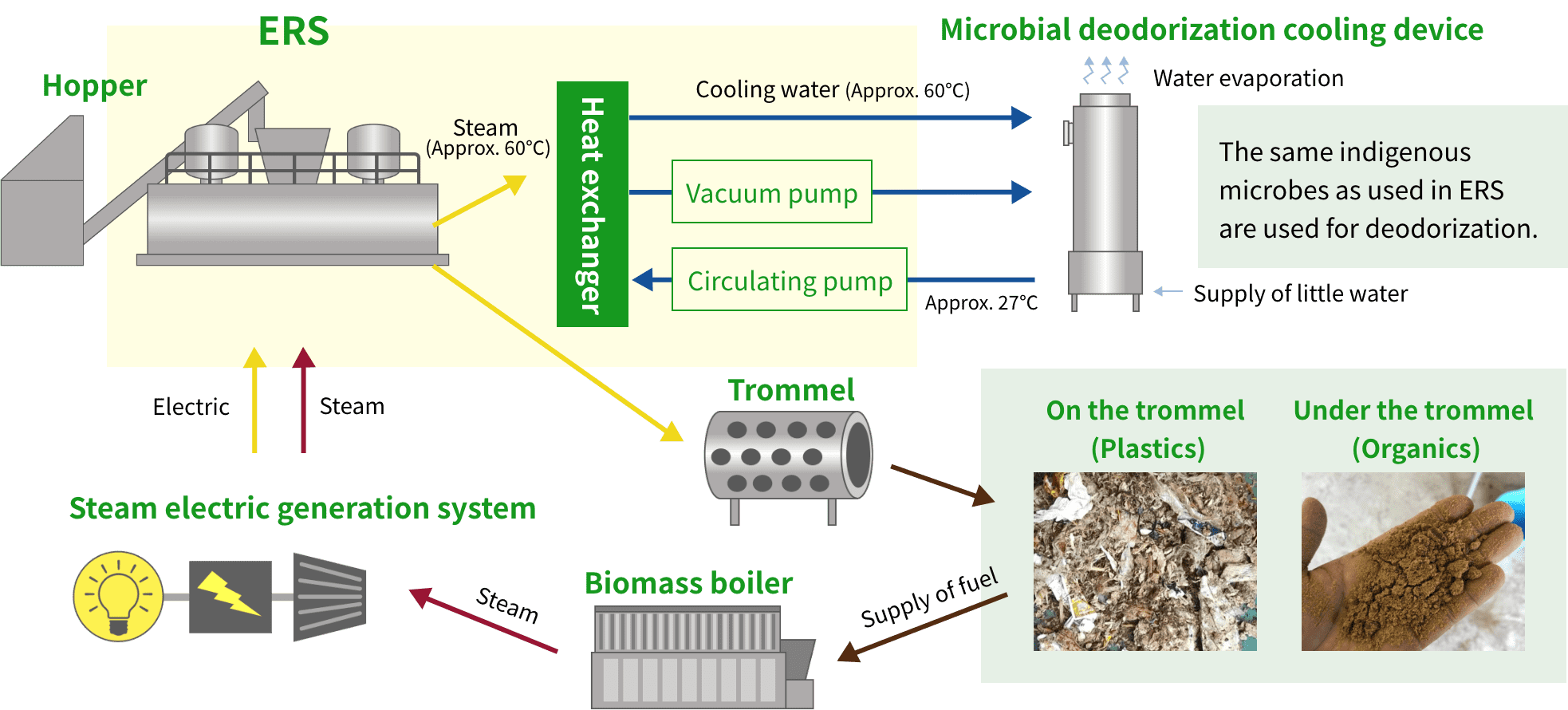
ERS Size
| Maximum processing weight per day (in 24-hour operation) |
|
| Body volume (㎥) | |
| Body size (m) | Width(W) |
| Depth(D) | |
| Height(H) | |
| ERS-1U | ERS-2U | ERS-3U | ERS-4U | ERS-5U |
| 2 ton/day | 4 ton/day | 8 ton/day | 15 ton/day | 25 ton/day |
| 3.15 | 5.93 | 10.25 | 15.51 | 19.81 |
| 6.3 | 8.3 | 9.9 | 14.1 | 15.3 |
| 3.2 | 3.2 | 3.4 | 4.1 | 4.3 |
| 3.8 | 4.2 | 4.6 | 4.7 | 4.8 |
*Maximum processing weight depends on the type and moisture content of the material to be processed.
PATENTS
ERS utilizes specific microbes collected from the local soil for its fermentation and drying process. 3 types of microbes were specified and deposited to the International Patent Organism Depositary (IPOD) at the National Institute of Technology and Evaluation (NITE), Japan.
These 3 microbes have a symbiotic relationship and deposited as the first-ever symbiotic microbes to the IPOD.
Deposit date: March 14, 2001
IPOD Patent No.:
FERMBP-7504, FERMBP-7505, FERMBP-7506
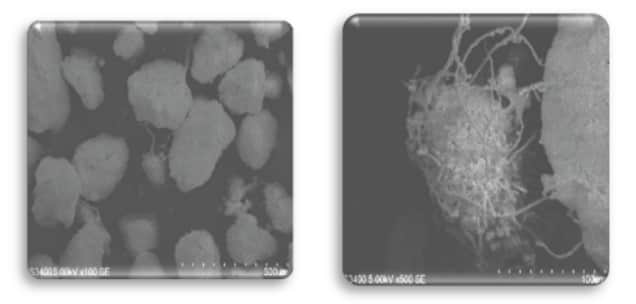
Device patents
- Microorganism, Composition Containing Microorganism, And Method For Manufacturing Organic Fertilizer Using The Microorganism
[JP] Patent No. 4153685 (July 11, 2008) - Apparatus And Method For Producing Fuel By Fermenting And Drying Object To Be Treated
[JP] Patent No. 6763575 (September 14, 2020)
[CN] ZL 2018 8 0052014.4 (September 10, 2021) - Fuel Production Device For Biomass Burner And Manufacturing Method For Same
[JP] Patent No. 6763576 (September 14, 2020)
[CN] ZL2018 8 0058171.6 (September 10, 2021) - Apparatus and method for treating organic matter including harmful microorganisms
[JP] Patent No. 6829468 (January 26, 2021)
[CN] ZL201880052013.X (August 9, 2022) - Apparatus and method for treating shell
[JP] Patent No. 7015044 (January 25, 2022) - Device and method for treating digested liquid from methane fermentation of organic material
[JP] Patent No. 7083160 (June 2, 2022) - Apparatus and method for treating plastic-packaged food waste
[JP] Patent No. 7114064 (July 29, 2022)
[CN] Patented No. ZL201980039470.X (October 21, 2022) - Device and method for manufacturing de-oiled dry product
[JP] Patent No. 7138329 (September 8, 2022) - Drying device for porous substance, hydrogen production device comprising same, and method for drying porous substance
[JP] Patented No. 7146277 (September 26, 2022) - System and method for treating oil sludge
[JP] Patented No. 7175005 (November 10, 2022) - Apparatus for treating livestock excrement, and method for treating livestock excrement
[JP] Patented No. 7178697 (November 17, 2022)
 Advantages of use of ERS
Advantages of use of ERS
-
กระบวนการหมักและกำจัดความชื้นด้วยความเร็วสูง
ตัวเครื่องหลักของระบบ ERS มีกลไกสำหรับลดแรงดันภายในเพื่อปรับลดอุณหภูมิจุดเดือดลงมาที่ 50 - 70 องศาเซลเซียส ซึ่งช่วยให้จุลินทรีย์ที่จดสิทธิบัตรแล้วภายในระบบ ERS หมักและกำจัดความชื้นขยะที่ใส่เข้ามาในระบบได้อย่างรวดเร็ว ถึงแม้ในขยะเหล่านั้นจะมีน้ำปริมาณมากก็ตาม
-
ไม่ปล่อยน้ำเสียและกลิ่นเล็ดลอดออกมา
ไม่จำเป็นต้องใช้เครื่องมือกำจัดน้ำเสียใด ๆ เพราะในระบบ ESR มีอุปกรณ์ทำความเย็นและขจัดกลิ่นด้วยจุลินทรีย์ ซึ่งรวบรวมความชื้นจากขยะและทำให้ระเหยไป โดยภายในอุปกรณ์ดังกล่าวของระบบ ESR จะมีจุลินทรีย์บางชนิดคอยสลายกลิ่นแอมโมเนียจากขยะในสภาพแวดล้อมที่เป็นสุญญากาศ
-
พัฒนาการรีไซเคิลขยะให้ก้าวไปอีกขั้น
ระบบ ESR จะแปรรูปขยะประเภทต่าง ๆ ให้ออกมาเป็นทรัพยากรที่มีค่าและคุณภาพสูงโดยควบคุมระดับการหมักและปริมาณความชื้นอย่างเป็นระเบียบ ขยะที่ผ่านการแปรรูปออกมาสามารถนำไปใช้เป็นเชื้อเพลิง ปุ๋ยหมัก ปุ๋ยคอก อาหารสัตว์ และวัสดุรองนอนสำหรับปศุสัตว์
-
ลดการปล่อยก๊าซเรือนกระจก
การลดปริมาณความชื้นและขนาดของขยะโดยกระบวนการ ERS นำไปสู่การลดการปล่อยก๊าซเรือนกระจกในการเผาขยะเมื่อใช้เตาเผา
-
ไม่จำเป็นต้องคัดแยกขยะก่อน
สามารถบำบัดขยะคละประเภทโดยไม่ต้องผ่านการคัดแยกก่อน ซึ่งลดความเสี่ยงทางสุขอนามัยของมนุษย์ และหลังบำบัดขยะก็มีทรอมเมล (เครื่องร่อนขยะ) ที่ช่วยให้คัดแยกประเภทได้ง่าย
-
ไม่จำเป็นต้องเติมจุลินทรีย์และเสี่ยงกับอันตรายทางชีวภาพ
ERS ใช้จุลินทรีย์ชนิดที่เก็บรวบรวมจากดินในพื้นที่ที่ติดตั้งระบบสำหรับกระบวนการหมักและกำจัดความชื้นขยะ ดังนั้นจึงไม่มีความเสี่ยงทางชีวภาพใด ๆ ต่อจุลินทรีย์ในสภาพแวดล้อมที่ติดตั้งระบบ ERS
-
ไม่จำเป็นต้องปรับระดับความชื้น
ไม่จำเป็นต้องใส่สารปรับความชื้นและเข้าสู่กระบวนการแยกน้ำ เพราะระบบ ERS สามารถบำบัดขยะอินทรีย์ที่มีปริมาณน้ำสูงได้อย่างมีประสิทธิภาพ
-
เปลี่ยนขยะเป็นพลังงาน
การผสาน ERS เข้ากับระบบกำเนิดพลังงานทำให้เป็นไปได้ที่จะผลิตไฟฟ้าเพื่อใช้ในครัวเรือนและ/หรือจำหน่ายด้วย
-
ข้อดีของการใช้งานแบบผสมผสาน
การใช้ระบบ ERS ร่วมกับเครื่องมือที่มีอยู่แล้ว (เช่น เตาเผาขยะ เครื่องหมักมีเธน หรือคลังเก็บปุ๋ย) มีประโยชน์หลายประการ รวมถึงลดค่าใช้จ่ายในการบำบัดขยะและภาระต่อสิ่งแวดล้อมด้วย
 What makes ERS different
What makes ERS different
| Generation of steam and electricity |
|---|
| Fermentation and drying(Fermenting at 65℃) |
| Sterilization of dead livestock(Heating at 90℃) |
| Cooling |
| Emission of odors and drain |
| Drying |
| Applications of processed resource |
| Usability as biomass fuel |
| Emission of GHG |
| Necessity of pre-segregation |
| Capability of segregation after processing |
| Necessity of subsequent material for fermentation |
| Time required for composting |
| Land space required for installment |
| Operability of device |
ERS
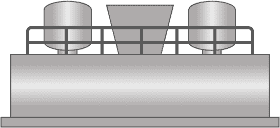
|
Conventional rendering

|
Conventional composting
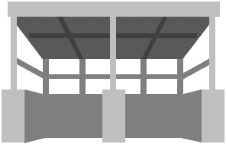
|
Tunnel composting
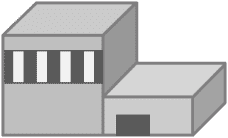
|
|
|---|---|---|---|---|
| Generation of steam and electricity | 〇 | × | × | × |
| Fermentation and drying(Fermenting at 65℃) | 〇 | × | 〇 | 〇 |
| Sterilization of dead livestock(Heating at 90℃) | 〇 | 〇 | × | × |
| Cooling | 〇(Vacuum cooling) | 〇(Open cooling) | × | × |
| Emission of odors and drain | None | Emitting | Emitting | None |
| Drying | 〇 | × | 〇 | 〇 |
| Applications of processed resource | Fuel・Fertilizer・Feed・Livestock Litter | × | Fertilizer | Fuel |
| Usability as biomass fuel | 〇 | × | × | 〇 |
| Emission of GHG | Least | More than ERS | More than ERS | More than ERS |
| Necessity of pre-segregation | None | Necessary | Necessary | None |
| Capability of segregation after processing | Capable | Not capable | Not capable | Not capable |
| Necessity of subsequent material for fermentation | None | None | Necessary | Necessary |
| Time required for composting | 1 day at earliest | Not able to compost | 2 to 6 months(Easily affected by climatic condition) | Approx. 20 days |
| Land space required for installment | Smallest | Larger than ERS | Larger than ERS | Larger than ERS |
| Operability of device | Easy | Complicated (Special trained operators are required) | Easy (But experience is required) | Easy (But experience is required) |
 Procedures to get ERS in your business
Procedures to get ERS in your business


การพบปะพูดคุย
เรายินดีตั้งใจรับฟังทุกเรื่องเกี่ยวกับการรีไซเคิลและการบำบัดขยะที่คุณกำลังรับมือหรือต้องการให้มีขึ้นจริง และพร้อมเสนอแนวทางแก้ปัญหาที่ดีที่สุดสำหรับธุรกิจของคุณ


การวางคำสั่งซื้อ
หลังได้รับคำสั่งซื้อจากคุณแล้ว เราจะเริ่มออกแบบการผลิตระบบ ERS อย่างละเอียด
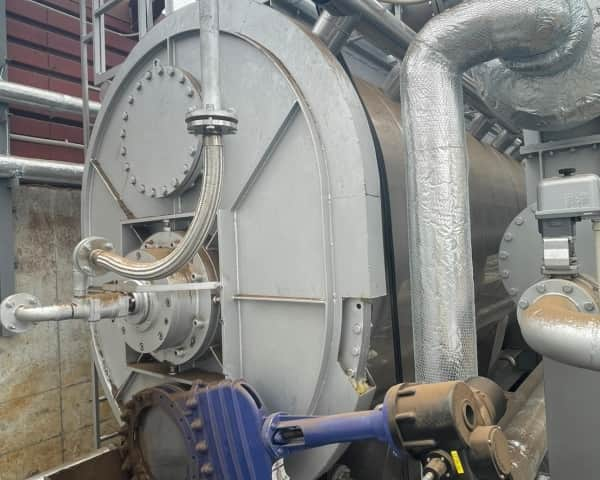

การขนส่ง.การติดตั้ง.และการจัดซื้อจัดจ้าง
เราจัดส่งอุปกรณ์ทุกชิ้นด้วยผู้ให้บริการจัดส่งที่ดีที่สุด และดำเนินการติดตั้งและการจัดซื้อจัดจ้าง ณ สถานที่จริง


การควบคุมระบบและการซ่อมบำรุง
การทำงานของระบบ ERS สามารถตรวจสอบแบบเรียลไทม์ผ่านหน้าจอคอมพิวเตอร์หรือสมาร์ตโฟน และจะมีการส่งอีเมลแจ้งเตือนหากระบบเกิดการทำงานผิดพลาดใด ๆ ขึ้นมา
โดยปกติแล้ว การจัดส่งใช้เวลาประมาณ 6 เดือน ทั้งนี้อาจเกิดความคลาดเคลื่อนโดยมีสาเหตุหลักจากสถานการณ์ในสังคมและเหตุผลอื่น ๆ ขอบคุณทุกท่านที่เข้าใจ
 COMPANY PROFILE
COMPANY PROFILE

COMPANY PROFILE
| Company name | JET, Inc. |
|---|---|
| CEO | Tomoyuki Katayama |
| Foundation | August 6, 2013 |
| Address | NOSAI Bldg. 4F, 19 Ichibancho, Chiyoda, Tokyo 102-0082, Japan |
| Capital | JPY 50 million |
| TEL | +81 (0)3-5213-4395 |
| FAX | +81 (0)3-3262-4572 |
| Main business |
●Manufacturing and sale of waste treatment system capable of treating non-segregated (mixed) general waste on the daily basis and converting the treated organic waste into valuable outputs (feed, fertilizer, fuel) through unmanned segregation of organic waste origin output and non-organic waste origin output ●Manufacturing and sale of livestock manure treatment system capable of treating manure on the daily basis and converting the treated waste into valuable outputs (feed, fertilizer, fuel) ●Sale of sludge and human excrement treatment system capable of treating sludge and human excrement on the daily basis and converting the treated matter into valuable outputs (feed, fertilizer, fuel) ●Manufacturing and sale of biomass power generation system using above-mentioned biomass fuel generated by the treatment system ●Manufacturing and sale of treatment system capable of sterilizing organic matters containing harmful microbes and converting them to feed or fertilizer |
| License held | General construction business license No. 151861 (G-2) approved by Governor of Tokyo |
Access
Traffic
3-minute walk from the Exit 4 at the Hanzomon Station by Hanzomon Line (Tokyo Metro)

















